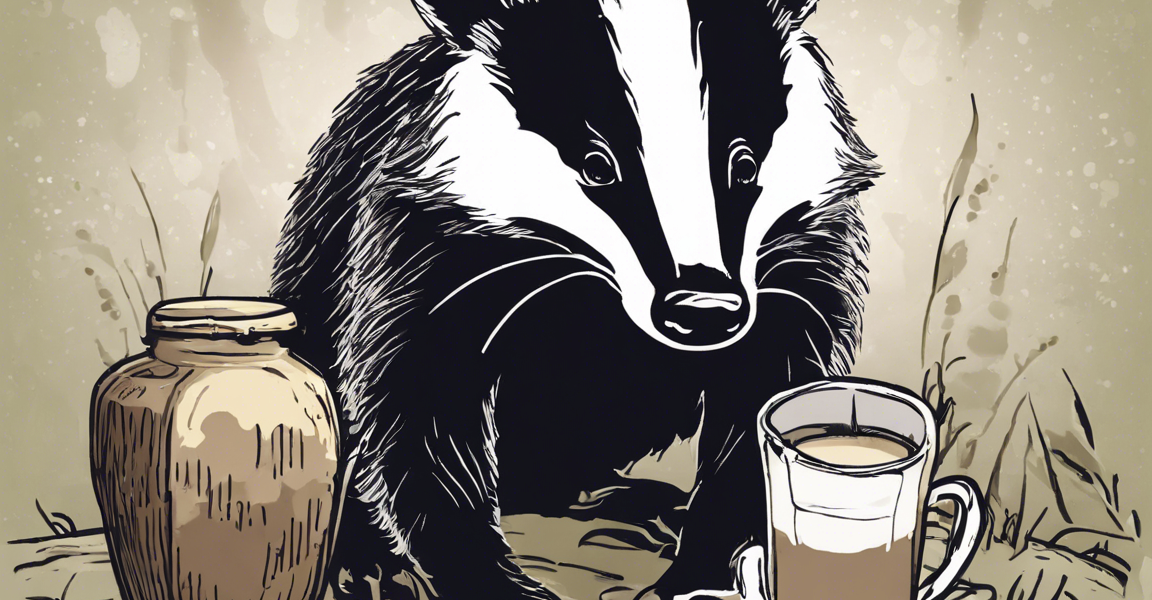Badgers are fascinating creatures known for their distinct black and white markings, burrowing habits, and elusive nature. However, one aspect of badgers that often sparks curiosity and even controversy is the idea of badger milk. While it may sound odd or even comical at first, the concept of badger milk has persisted through various myths, folklore, and even alternative medicinal practices. In this comprehensive article, we will delve into the truth behind badger milk: is it a myth or a reality?
Badgers: Nature’s Engineers
Before we delve into the realm of badger milk, it is essential to have a basic understanding of these remarkable creatures. Badgers belong to the family Mustelidae and are known for their stout bodies, short legs, and distinctive facial markings. They are primarily nocturnal animals with powerful digging abilities, using their long claws to excavate elaborate underground burrow systems known as setts.
In terms of diet, badgers are omnivores, with a diet consisting of earthworms, insects, small mammals, fruits, and roots. They are opportunistic feeders and play a crucial role in controlling pest populations, particularly in agricultural landscapes.
The Myth of Badger Milk
The notion of badger milk and its purported benefits can be traced back to ancient times when various cultures ascribed mystical and healing properties to this elusive substance. Some historical accounts suggest that badger milk was used in traditional medicine for its purported anti-inflammatory, antibacterial, and rejuvenating properties.
One popular myth surrounding badger milk is its ability to enhance vitality and youthfulness. In some cultures, it was believed that consuming badger milk could boost energy levels, improve skin complexion, and even prolong life. However, the reality is that there is no scientific evidence to support these claims, and the idea of badger milk as a miraculous elixir remains firmly rooted in folklore.
Dissecting the Reality: Badger Biology and Lactation
To understand the plausibility of badger milk, it is essential to examine the biological aspects of badgers and the phenomenon of lactation in mammals. Female badgers, known as sows, typically give birth to litters of 1-5 cubs in underground dens. Like other mammals, badgers produce milk to nourish their offspring.
Badger milk composition is tailored to meet the nutritional needs of growing cubs, containing essential nutrients such as fat, proteins, carbohydrates, and antibodies to support their development. However, unlike domestic dairy animals like cows or goats that are commonly milked by humans, badgers do not lend themselves to milk production for human consumption.
Separating Fact from Fiction: Ethical Considerations
While the concept of badger milk may evoke curiosity or intrigue, it is crucial to address the ethical considerations surrounding this topic. Badgers are wild animals that play a vital role in ecosystems, and milking badgers for human consumption raises significant ethical concerns.
The process of extracting milk from wild animals poses numerous challenges, including issues of animal welfare, conservation, and biosecurity. Furthermore, the stress and potential harm inflicted on badgers in such practices far outweigh any perceived benefits of consuming their milk.
Common Misconceptions and Alternative Practices
In some alternative medicinal practices or traditional folklore, badger milk is touted as a remedy for various ailments, ranging from skin conditions to respiratory disorders. Such claims often lack scientific basis and may perpetuate misconceptions about the health benefits of unconventional substances.
It is essential to approach health and wellness practices with a critical mindset and rely on evidence-based information when evaluating the efficacy of different remedies. While the allure of exotic or rare substances like badger milk may be intriguing, it is important to prioritize science-based approaches to healthcare.
Frequently Asked Questions (FAQs)
1. Is badger milk a real substance?
* Badger milk is a real substance produced by female badgers to nurse their young. However, it is not typically consumed by humans.
2. Are there any health benefits to consuming badger milk?
* There is no scientific evidence to support the idea that consuming badger milk offers health benefits to humans.
3. Can badgers be milked like cows or goats?
* Badgers are wild animals and do not lend themselves to domestication or the milking process.
4. What are the ethical concerns associated with extracting badger milk?
* Milking badgers for human consumption raises significant ethical considerations related to animal welfare, conservation, and biosecurity.
5. Are there any safe alternatives to badger milk for skincare or other purposes?
* There are numerous safe and effective alternatives for skincare and wellness products that do not involve using exotic or ethically questionable substances.
In conclusion, the concept of badger milk exists at the intersection of myth, folklore, and alternative practices. While badgers are remarkable animals with unique biological adaptations, the idea of consuming their milk for human benefit remains firmly rooted in mythology rather than reality. It is essential to approach such topics with a critical lens, prioritize evidence-based information, and consider the ethical implications of our interactions with wildlife.



